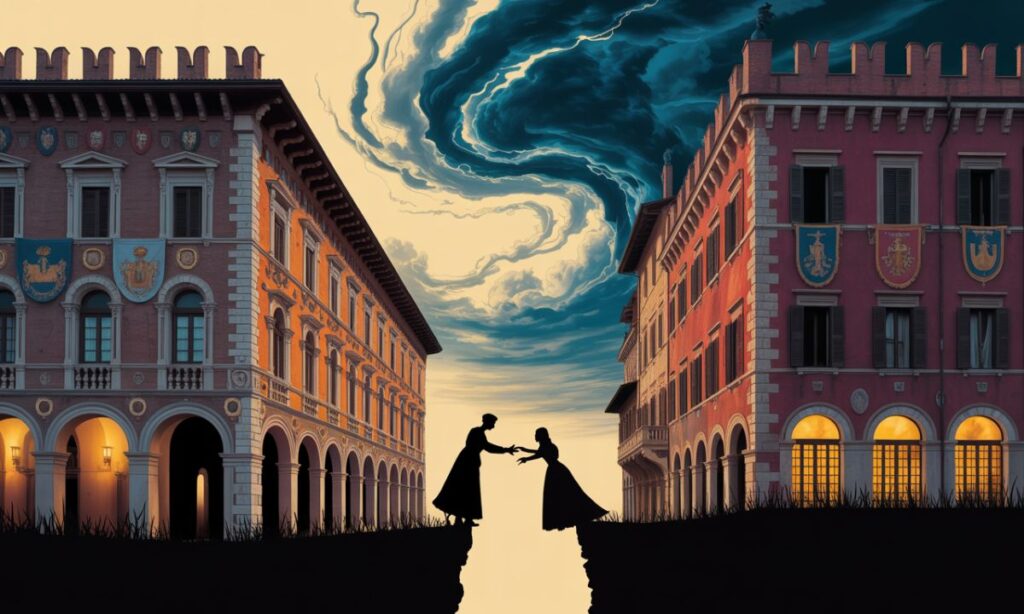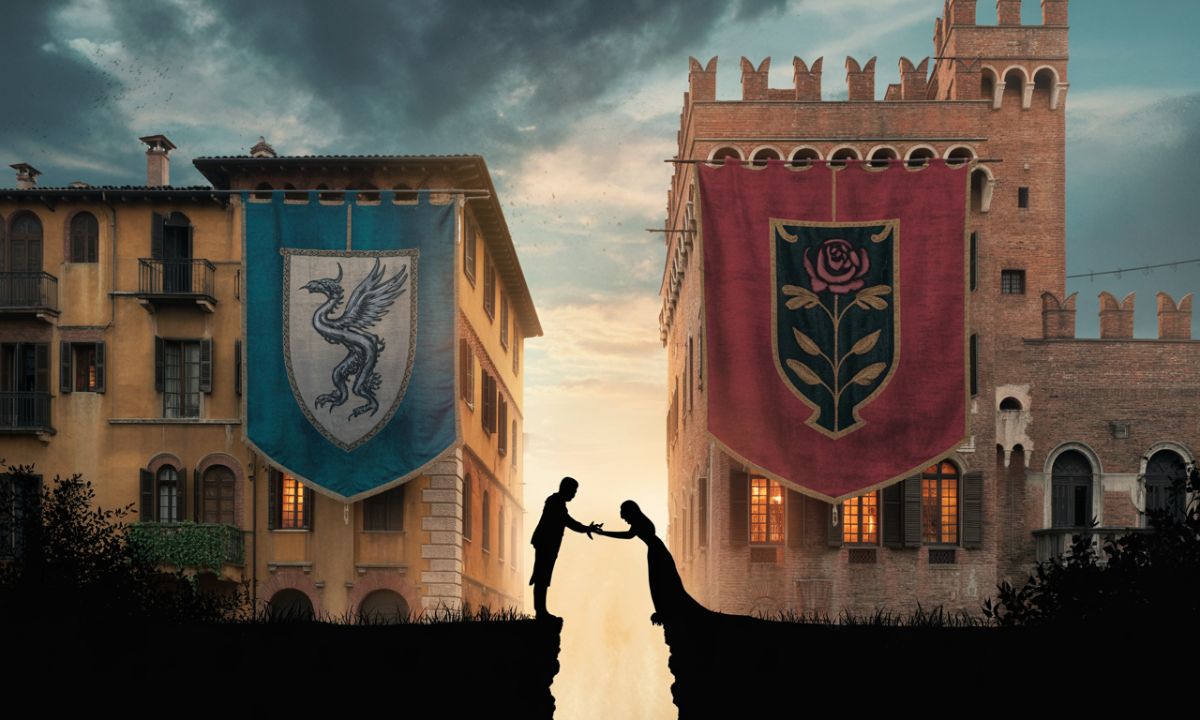Two wealthy families in a beautiful Italian city can’t stop fighting. Their hatred runs so deep that even their servants throw punches in the street. Sound familiar? You’ve probably seen similar feuds play out in reality TV or social media drama. But Shakespeare’s Romeo and Juliet takes this concept and cranks it up to eleven, showing us exactly how family dysfunction can destroy everything we hold dear.
The Montague and Capulet families don’t just contribute to the tragedy—they architect it. Through their toxic masculinity, communication failures, and stubborn pride, these two households create the perfect storm for catastrophe. Their destructive power turns what should be a love story into a tragic narrative that’s haunted audiences for over 400 years.
The Roots of Hatred: The Long-Standing Feud
The family feud between the Montagues and Capulets isn’t some recent disagreement over a parking spot. This is what Shakespeare calls an “ancient grudge”—a generational conflict so old that nobody even remembers how it started. Talk about holding a grudge!
The Cycle of Inherited Hatred
When we first meet these families, they’re already locked in a pattern of violence. The opening scene shows us servants from both houses ready to fight at the drop of a hat. Sampson and Gregory from the Capulets actively look for trouble, while Abraham and Balthasar from the Montagues are equally eager to brawl.
“Do you bite your thumb at us, sir?” – Abraham
This famous line reveals how deeply the ongoing rivalry has infected every level of society. Even gestures become weapons in this unresolved familial conflict.
The Cost of Normalizing Violence
The Verona families have made hatred their default setting. Consider these disturbing facts:
- Three major street fights have already happened before the play begins
- The Prince threatens death for future brawls
- Tybalt is described as loving to fight more than he loves peace
- Even Lady Capulet calls for blood when Tybalt dies
| Character | Violent Actions | Motivation |
| Tybalt | Seeks out Romeo for fighting | Family honor and pride |
| Lord Capulet | Threatens to disown Juliet | Controlling authority |
| Sampson | Provokes street fights | Inherited hatred |
| Gregory | Participates in brawls | Loyalty to family feud |
This hostility becomes so normalized that children grow up thinking violence is the answer to everything. The families have created a culture where love takes a backseat to revenge.
Toxic Masculinity and Honor Culture
Both families worship at the altar of masculine pride. They’ve built their entire identities around being tougher, prouder, and more “honorable” than their rivals. But here’s the twisted part—their obsession with honor destroys the very things that actually matter.
The Pressure to Prove Manhood
Tybalt embodies everything wrong with this system. He can’t let any perceived slight go unpunished. When Romeo shows up at the Capulet party, Tybalt’s first instinct isn’t to enjoy the celebration—it’s to start a fight.
“This, by his voice, should be a Montague. Fetch me my rapier, boy.” – Tybalt
This aggressive behavior stems from societal expectations that equate masculinity with violence. Tybalt literally cannot conceive of backing down because that would make him “less of a man” in his twisted worldview.
The Macho Culture’s Victims
The toxic masculinity doesn’t just hurt the men—it devastates the women too. Juliet becomes a pawn in her father’s honor game. When she refuses to marry Paris, Lord Capulet explodes with rage:
“Hang thee, young baggage! Disobedient wretch! I tell thee what: get thee to church o’ Thursday, or never after look me in the face.”
Lord Capulet’s reaction reveals how macho culture treats women as property. Juliet’s feelings don’t matter—only his reputation does.
The Irony of “Honor”
Here’s what’s truly tragic: Both families claim to fight for honor, but their actions are completely dishonorable. They:
- Put pride before their children’s happiness
- Choose violence over peace
- Value reputation more than relationships
- Destroy innocent lives to protect their image
The destructive power of their masculine pride ultimately kills the very people they claim to protect.
Lack of Communication and Misunderstandings

If the Montague and Capulet families had a relationship status on social media, it would be “It’s complicated.” Actually, scratch that—it would be “We don’t talk, we just fight.” Their communication failures create a domino effect of misunderstandings that lead straight to the catastrophic conclusion.
The Secret Marriage Trap
Why do Romeo and Juliet feel they must marry in secret? Because both families have created an environment where honest communication is impossible. The star-crossed lovers know their families would rather see them dead than together.
This emotional disconnection between parents and children sets up the first major miscommunication. When Juliet returns from her secret wedding, her parents interpret her distress as grief over Tybalt’s death, not as conflict over their marriage demands.
The Chain Reaction of Assumptions
Watch how quickly things spiral out of control:
- Lord Capulet assumes Juliet needs cheering up
- He arranges her marriage to Paris without asking her opinion
- Juliet can’t explain why she’s refusing without revealing her secret
- The Nurse assumes Juliet should just marry Paris and forget Romeo
- Friar Lawrence assumes his potion plan will work perfectly
- Romeo assumes Juliet is actually dead
Each assumption builds on the last, creating a tower of miscommunication that finally collapses in the sorrowful ending.
The Adults Who Don’t Listen
The authority figures in both families share a crucial flaw: they don’t actually listen to their children. Lord Montague admits he doesn’t know why Romeo is so sad. Lady Capulet can’t connect with Juliet on an emotional level. The Nurse, who should be Juliet’s confidant, betrays her trust when things get complicated.
“I think it best you married with the County. O, he’s a lovely gentleman!” – The Nurse
This breakdown in communication shows how the generational conflict extends beyond the family feud. The older generation simply cannot understand or relate to the younger one.
Escalation of Conflict: Key Turning Points
The tragic narrative doesn’t happen overnight. Instead, it builds through a series of escalating decisions where each family makes choices that push events toward disaster. Like a slow-motion car crash, we can see the catastrophic conclusion coming, but nobody can stop it.
The Party: Where It All Begins
Lord Capulet’s decision to throw a party sets everything in motion. But notice what happens when Tybalt recognizes Romeo:
- Tybalt wants to fight immediately
- Lord Capulet tells him to calm down (rare moment of restraint)
- Tybalt seethes with anger but obeys
- This restraint only makes him more dangerous later
The party reveals how the ongoing rivalry has primed both families for violence. One small spark—Romeo’s presence—nearly ignites a full brawl.
The Street Fight: Point of No Return
When Tybalt finally gets his chance to fight, the family feud claims its first victim. But notice how both families contribute to this disaster:
Montague Family Mistakes:
- Romeo refuses to fight, which Mercutio sees as cowardice
- Mercutio fights in Romeo’s place, getting himself killed
- Romeo then kills Tybalt in revenge
Capulet Family Mistakes:
- Tybalt seeks out Romeo for a fight
- He refuses to let the party incident go
- His aggressive behavior provokes the fatal confrontation
The Marriage Ultimatum: Family Control Gone Wrong
After Tybalt’s death, both families make their worst decisions. Lord Capulet suddenly changes his mind about letting Juliet choose her husband. His parental control becomes a weapon:
“An you be mine, I’ll give you to my friend; an you be not, hang, beg, starve, die in the streets.”
This ultimatum shows how societal expectations and cultural norms can become tools of oppression. Lord Capulet doesn’t care about Juliet’s happiness—he only cares about his own plans.
The Role of Authority Figures

The adults in Romeo and Juliet should be the voice of reason. Instead, they’re the institutional leaders who enable and escalate the tragedy. Their parental control and power figures status make them responsible for guiding the younger generation—but they fail spectacularly.
Lord Capulet: The Inconsistent Father
Lord Capulet gives us whiplash with his contradictory behavior. In Act 1, he tells Paris:
“My child is yet a stranger in the world. She hath not seen the change of fourteen years. Let two more summers wither in their pride ere we may think her ripe to be a bride.”
But by Act 3, he’s forcing Juliet to marry Paris immediately. This inconsistency shows how authority figures can become unpredictable when their pride is threatened.
The Nurse: The Betrayer
The Nurse represents the most heartbreaking betrayal. She helps Juliet marry Romeo in secret, then completely reverses course when things get complicated. Her advice to marry Paris reveals how conventional demands can corrupt even the most loving relationships.
Lord Montague: The Distant Father
Lord Montague barely appears in the play, which tells us everything we need to know about his parenting style. He’s so emotionally disconnected from Romeo that he has to ask Benvolio about his son’s mood. This lack of empathy leaves Romeo without proper guidance when he needs it most.
The Prince: Reactive Leadership
Prince Escalus represents governmental authority, but he’s always one step behind the violence. His threats don’t prevent the family feud—they just make both families more careful about when and where they fight.
The Final Catastrophe
The catastrophic conclusion of Romeo and Juliet brings together every family failure in one devastating scene. The Montague and Capulet families’ destructive power reaches its peak in the tomb, where their ongoing rivalry finally claims its ultimate victims.
The Tragic Timing
Shakespeare structures the ending to show how the family feud creates its own disastrous end. Consider this timeline:
| Time | Event | Family Contribution |
| Tuesday | Juliet takes the potion | Forced by Capulet marriage ultimatum |
| Wednesday | Romeo buys poison | Exiled due to family feud violence |
| Thursday | Romeo finds “dead” Juliet | Friar’s message blocked by plague |
| Thursday | Both lovers die | Communication failures prevent rescue |
Every single event connects directly to the families’ harmful force and damaging influence.
The Ultimate Irony
The heartbreaking story reaches its peak irony when Romeo and Juliet die literally feet apart from their families’ reconciliation. The Montague and Capulet parents finally understand what their unresolved familial conflict has cost them.
“See what a scourge is laid upon your hate, that heaven finds means to kill your joys with love!” – Prince Escalus
The Prince’s words reveal the central tragedy: the families’ hatred has destroyed the very thing that could have brought them together.
What the Families Lose vs. What They Gain
Losses:
- Their children’s lives
- Their family legacies
- Their capacity for joy
- Their innocence
- Their future generations
Gains:
- A hollow peace
- Golden statues (cold comfort)
- Public reconciliation
- Shared grief
- A cautionary tale
The tragic finale shows how the family feud ultimately destroys both families equally. Neither side “wins”—they all lose everything that matters.
Fun Facts You Didn’t Know About “Romeo and Juliet”

Ready for some mind-blowing trivia about this melodrama? These facts will change how you see the Montague and Capulet families and their perpetual discord.
Historical Inspiration
Shakespeare didn’t invent the Verona families—he was inspired by real Italian history! The Montecchi and Capuleti were actual political factions in medieval Italy. However, they weren’t from Verona—they were from different cities entirely.
The Age Factor
In Shakespeare’s original version, Juliet is only 13 years old. This wasn’t unusual for the time, but it adds another layer to the family dysfunction. The Capulets are literally forcing a child into marriage.
The Balcony Scene Mystery
Here’s a shocker: Shakespeare never actually wrote “balcony scene.” The famous balcony was added in later productions. In the original text, Juliet appears at a window, not on a balcony.
Global Impact Statistics
- Romeo and Juliet has been translated into over 80 languages
- There are more than 40 film adaptations
- The play is performed somewhere in the world every single day
- Verona receives over 1 million tourists annually because of the play
The Verona Tourism Connection
The ongoing rivalry between the Montagues and Capulets has become Verona’s biggest tourist attraction. The city has:
- Built a fake Juliet balcony
- Created a Juliet statue that tourists touch for luck
- Established a Juliet club that answers love letters
- Marketed itself as the “City of Love”
The irony? A story about how family feud destroys love has become a celebration of romance.
Conclusion: The Tragedy of Misguided Priorities
The Montague and Capulet families don’t just contribute to the catastrophe in Romeo and Juliet—they engineer it through their toxic masculinity, communication failures, and stubborn pride. Their destructive power transforms a simple love story into a tragic narrative that resonates across centuries.
Both families share equal responsibility for the sorrowful ending. The Montagues and Capulets prioritize:
- Family honor over family happiness
- Masculine pride over emotional connection
- Generational conflict over peace
- Societal expectations over individual desires
The Modern Relevance
This heartbreaking story remains relevant because family dysfunction hasn’t gone anywhere. We still see:
- Toxic masculinity in modern relationships
- Communication failures between generations
- Authority figures who prioritize control over connection
- Emotional disconnection in families obsessed with image
The Universal Lesson
Shakespeare’s masterpiece teaches us that unresolved familial conflict has consequences that extend far beyond the original participants. The Montague and Capulet families’ harmful force doesn’t just hurt them—it destroys innocent lives and corrupts entire communities.
The catastrophic conclusion serves as a warning: when families choose hate over love, pride over peace, and control over connection, everyone loses. The golden statues the families erect at the end are beautiful—but they’re cold comfort for the warm children they could have embraced instead.
Romeo and Juliet reminds us that the ruinous impact of family dysfunction can be prevented, but only if we choose communication over conflict, love over pride, and understanding over judgment. The star-crossed lovers died because their families forgot that being right isn’t worth being alone.
What family conflicts in your own life might benefit from more communication and less pride? Share your thoughts and keep the conversation going about how we can learn from the Montague and Capulet families’ tragic mistakes.
Frequently Asked Questions
Q: What started the feud between the Montague and Capulet families?
A: Shakespeare never reveals what started the family feud! He calls it an “ancient grudge,” showing how the ongoing rivalry has become so ingrained that nobody remembers the original cause.
Q: How do both families equally contribute to Romeo and Juliet’s deaths?
A: Both families share responsibility. The Capulets contribute through Tybalt’s violence and forced marriage demands. The Montagues contribute through Romeo’s impulsive revenge and distant parenting. Their destructive power creates the tragedy.
Q: Why didn’t Romeo and Juliet just tell their families about their marriage?
A: The star-crossed lovers knew their families would rather see them dead than together. The communication failures and hostility between families made secrecy their only option.
Q: What role does toxic masculinity play in the family conflict?
A: Toxic masculinity drives every major conflict. Both families created a culture where masculine pride matters more than relationships and violence is seen as honorable. This harmful force destroys what they claim to protect.
Q: Could the tragedy have been prevented?
A: Yes! The catastrophic conclusion could have been avoided if either family had chosen communication over conflict and listened to their children instead of prioritizing pride over peace.

Admin: Jiya Pari
Jiya Pari is the talented admin of Cutegirlphoto.info, bringing 5 years of experience in blogging and content creation. She manages the site with creativity and care, ensuring a fun and engaging experience for all visitors.





